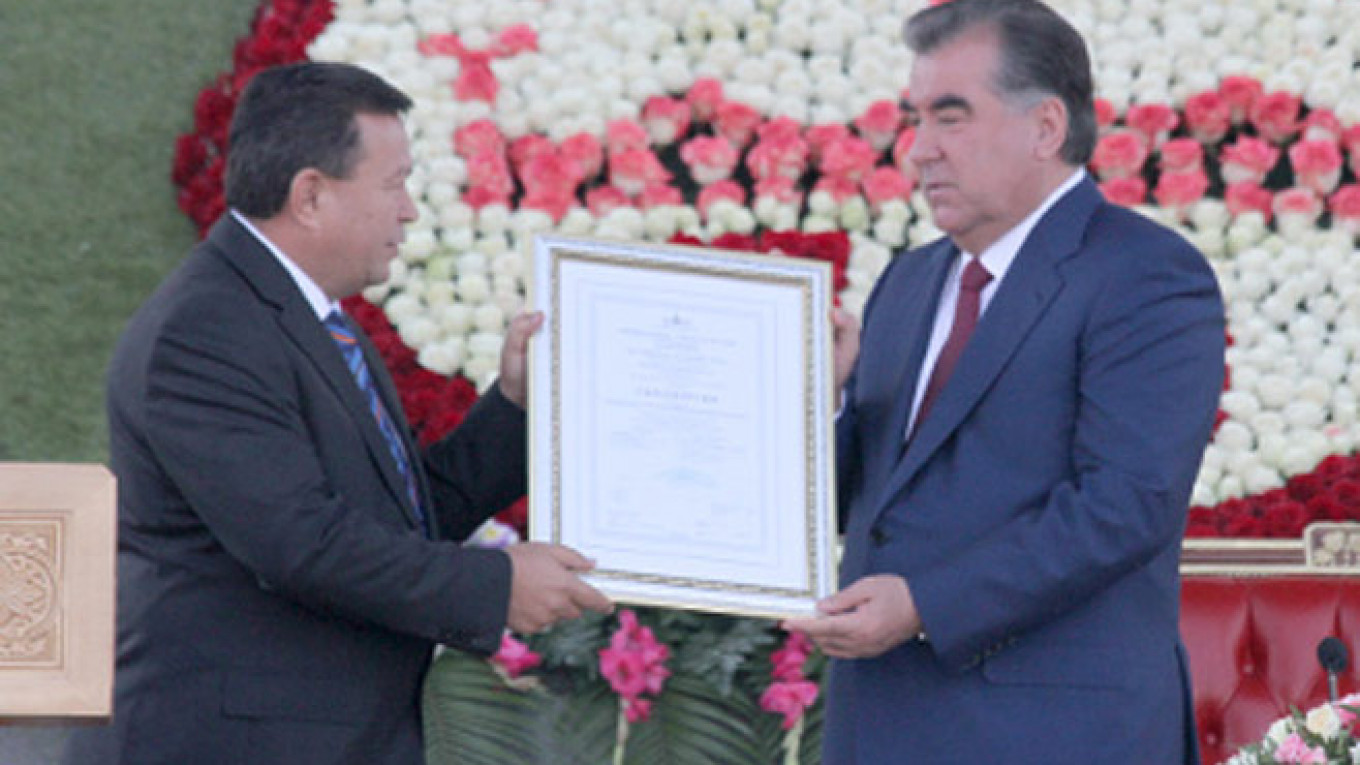The former Soviet republic of Tajikistan was finally recognized for its vast contributions to the study of the heavens on Tuesday when an international body of space scientists renamed a small planetoid in the distant reaches of the solar system after the small Central Asian nation.
Or at least that is what the head of Tajikistan's Academy of Sciences, Farkhod Rakhimi, told his strongman president, Emomali Rahmon, as he presented him with a corresponding certificate Tuesday during the annual Day of Knowledge celebration, as the first day back at school is known throughout the former Soviet Union.
"The International Community of Astrophysicists has named one of the solar system's minor planets 'Tajikistan' [in recognition] of the outstanding contribution of Tajik scientists to the development of the world of astrophysics and the study of heavenly bodies," a statement on the Tajik Academy of Sciences website said on Tuesday.
One problem is that the International Community of Astrophysicists does not exist. Multiple Google searches for the organization in both Russian and English yielded no mentions of the group before Tuesday, when Russian state news agencies like TASS and RIA Novosti picked up the story.
Furthermore, it is impossible to independently identify the celestial body in question based on the scant information about the Tajikistan planetoid given in Tuesday's statement: Several more data points are needed to work out specifically where the object in question is located — and it is a big sky.
The Tajik Academy of Sciences' statement said only that Tajikistan the planet orbits the sun once every five years at a distance of around 463 million kilometers away from it — placing it somewhere between Mars and Jupiter. This would certainly be the right place to find a small planetoid, but without more data it is impossible to say whether "Tajikistan" is fact or fictional pandering.
The Tajik Academy of Sciences did not respond to an e-mail from The Moscow Times requesting information on the planetoid and a copy of the certificate from the International Community of Astrophysicists attesting to the name change. Phone calls went unanswered on Thursday before this article's publication.
In an effort to identify the planetoid in question, and verify that it was named Tajikistan, The Moscow Times reached out to the officially recognized authority on naming planets and celestial objects: the International Astronomical Union (IAU), not to be confused with the mysterious International Community of Astrophysicists.
Although it is possible that the Russian-language reports confused the IAU for an entity called the International Community of Astrophysicists, IAU spokesman Lars Christensen said Thursday in an e-mail response to The Moscow Times that he was unable to locate a minor planet named Tajikistan in the organization's database — which is expansive and authoritative.
Later on Thursday, Gareth Williams, the head of the IAU's Minor Planet Center — which would have tracked and catalogued Tajikistan — confirmed that no such planetoid exists in the organization's catalogues.
The IAU was responsible for the controversial 2006 decision to strip Pluto of its status as the solar system's ninth planet, and would have been the organization that awarded a minor planet with a Tajik namesake.
When asked if the IAU was familiar with the International Community of Astrophysicists, Christensen simply said that the IAU had no further information on the matter.
However, Williams later pointed out that there is a minor planet designated (2469) Tadjikistan [sic], but the object was named in 1982. The Tajik Academy of Sciences claimed that an existing object was renamed Tajikistan, suggesting the intent was to present a new celestial body named after the former Soviet republic.
There are a handful of smaller organizations across the globe that crowd-fund their astronomy efforts by allowing donors to "name" a star, and even receive a certificate. This was the case with last year's controversial naming of a star "Putin is a D---head" by a group of Ukrainian astronomers.
However, the head of the Tajik Academy of Sciences presented the award as a gesture of recognition from the international scientific community of Tajikistan's contribution to science, and regardless of whether this is an official designation, Rakhimi was not deterred from relishing in his small authoritarian nation's latest scientific triumph.
"Currently, [Tajikistan] is at its closest [orbital] distance from Earth, and Tajik scientists have been studying its physical and chemical properties and the processes occurring on this planet," he was quoted by TASS as saying at the certificate's presentation ceremony Tuesday.
Rakhimi pointed out that the Churyumov-Gerasimenko comet, on which the European Space Agency landed its Philae spacecraft last year, was discovered in part by Ukrainian-Tajik astronomer Svetlana Gerasimenko in 1969.
Tajik President Rahmon was quoted by TASS as saying that "such valuable achievements require our scientists and researchers to work in the interests of the state, nation and all mankind."
Contact the author at m.bodner@imedia.ru
A Message from The Moscow Times:
Dear readers,
We are facing unprecedented challenges. Russia's Prosecutor General's Office has designated The Moscow Times as an "undesirable" organization, criminalizing our work and putting our staff at risk of prosecution. This follows our earlier unjust labeling as a "foreign agent."
These actions are direct attempts to silence independent journalism in Russia. The authorities claim our work "discredits the decisions of the Russian leadership." We see things differently: we strive to provide accurate, unbiased reporting on Russia.
We, the journalists of The Moscow Times, refuse to be silenced. But to continue our work, we need your help.
Your support, no matter how small, makes a world of difference. If you can, please support us monthly starting from just $2. It's quick to set up, and every contribution makes a significant impact.
By supporting The Moscow Times, you're defending open, independent journalism in the face of repression. Thank you for standing with us.
Remind me later.






